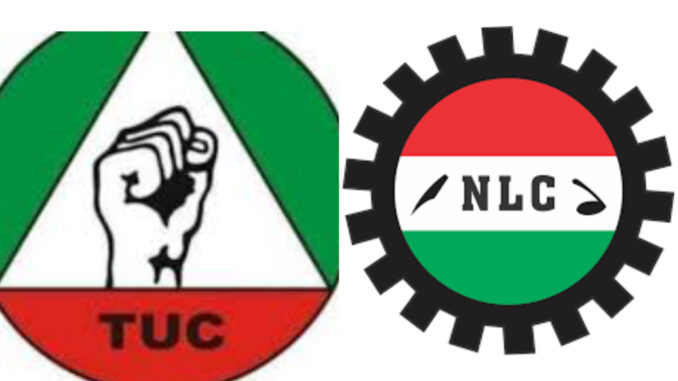
The Nigeria Labour Congress (NLC) and the Trade Union Congress (TUC) have announced the commencement of an indefinite nationwide strike begining from Monday, June 3, 2024 just as they called on all affiliates, state councils, civil society organizations, market traders, and the general public to prepare for decisive action.
The unions stressed that the welfare of Nigerian workers and citizens is non-negotiable and vowed to take all necessary steps to protect their rights and ensure their voices are heard.
They expressed grave concern and disappointment over the Federal Government’s failure to pass a new National Minimum Wage Act and reverse the recent hike in electricity tariffs to N65/kWh.
Following today’s inconclusive meeting, the unions criticized the government’s apparent disregard for the demands of Nigerian workers and citizens.
The meeting was marked by the absence of key government officials, including all Governors and relevant Ministers, except for the Minister of State for Labour and Employment, who served as a conciliator.
The unions described the government’s absence as a clear sign of their lack of commitment to resolving the critical issues at hand.
The NLC and TUC reminded the public that during the May Day celebrations on May 1, 2024, they had issued a clear ultimatum to the Federal Government to conclude the National Minimum Wage negotiations by the end of the month. Despite this, there has been no significant progress or commitment from the government.
In addition to the wage issues, the unions have demanded the reversal of the electricity tariff hike from N225/kWh back to N65/kWh and an end to the categorization of consumers into Bands.
Despite a nationwide one-day protest on May 13, 2024, the government has shown no positive response to these demands, despite widespread public outrage.
The NLC and TUC emphasized that Nigerian workers, who are the backbone of the nation’s economy, deserve fair and decent wages that reflect current economic realities criticizing the government’s neglect of its responsibilities and attempts to intimidate trade union leaders instead of engaging in meaningful dialogue.
The unions reiterated their belief that the welfare of the people should be the primary focus of governance. They argued that the hike in electricity tariffs further impoverishes the already suffering populace and denies them a decent living standard.

Leave a Reply